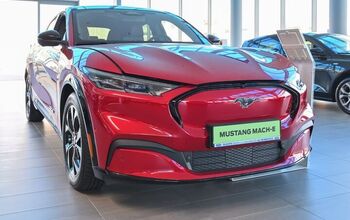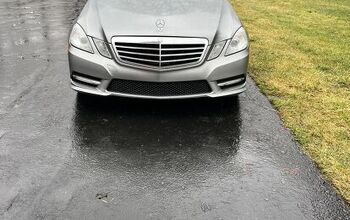Ford Revises Dealer EV Requirements

In what could be a tacit admission the transition to electric vehicles is going approximately as smoothly as a Michigan secondary road, it is being reported that suits at the Blue Oval are rolling back some of the requirements demanded of dealers in order to shill EVs to customers.
According to those in the know at Automotive News, Ford is slashing the required dealer training on electron eaters in half, while also cutting the number of EV chargers a retailer must install. As an example, storefronts popping for the so-called Certified Elite badge of honor now need only install a trio of Level 2 chargers instead of the previous suggestion of five. As well, the requirement of building a burly Level 3 DC fast charger sometime before 2026 has been removed from the agreement altogether.
Meanwhile, dealers fronting for mere Certified (sans Elite) status are on the hook for just two Level 2 chargers, again down from the previous watermark of five. Deadlines for the work to be completed in either case has been pushed back to the end of next June. Supply chain and infrastructure problems are being blamed for the changes.
Of course, our readers in the B&B know the difference. These alterations smack to high heaven of dealer pushback, showing up in the form of loud declarations from Dealer Principals to Area Managers about cost, timing, and color of the showroom tiles. In fact, over two dozen dealers in the state of Illinois successfully pursued a legal case in which they argued the old program violated state franchise laws. As anyone with half a brain would expect, many complaints were lodged about the cost of Level 3 chargers, most of which can recharge an EV in jig time but can hoover up a six-figure invoice without blinking. Dealers apparently argued that slow Level 2 chargers were more than sufficient to keep new EVs full of juice for test drives.
It is worth noting that Level 2s are widely available from a host of different providers – both for commercial and residential installations – and are popping up quicker than kudzu in Kansas. Alert readers will also question how much language is in these agreements requiring dealers keep the chargers in good working order after installing them. If that caveat is not present, there’s every chance in the world those chargers - placed by unwilling dealers who also surely complain about giving away free electricity – will be deader than disco in no time.
[Images: Ford]
Become a TTAC insider. Get the latest news, features, TTAC takes, and everything else that gets to the truth about cars first by subscribing to our newsletter.

Matthew buys, sells, fixes, & races cars. As a human index of auto & auction knowledge, he is fond of making money and offering loud opinions.
More by Matthew Guy
Latest Car Reviews
Read moreLatest Product Reviews
Read moreRecent Comments
- Carson D There is a story going around that a man who bought a new Tundra was contacted by his insurance company because his son's phone had paired with his infotainment system, and the insurance company added his son to his policy as a result. If Toyota is cooperating with insurance companies, one might think that they're doing so in order to get lower rates for their vehicles as a selling feature. Spying on your customers and ratting them out to insurance companies is not a selling feature. I know of one sale that it has already cost them.
- Chris P Bacon "Needs a valve replaced" and has a cracked windshield, which would be a problem if you live in a state with an annual safety inspection. Based on the valve alone, it's overpriced. If those issues were corrected, it might be priced about right to be a cheap ride until something bigger broke. It's probably a $500 car in current condition.
- SilverHawk Being a life-long hobby musician, I have very eclectic tastes in music. 2 of my vehicles have a single-disk cd player, so that's how I keep my sanity on the road.
- Golden2husky So the short term answer is finding a way to engage the cloaking device by disabling your car's method of transmitting data. Thinking out loud here - would a real FSM show the location of the module and antenna...could power be cut to that module? I'm assuming that OTA updates would not occur but I wonder what else might be affected...I have no expectations of government help but frankly that is exactly what is required here. This is a textbook case where the regulatory sledgehammer is the only way to be sure.
- Rna65689660 KLOVE.com, will give you all the stations on your roadtrip.

































Comments
Join the conversation
Climate change - the undefinable term that just results in more government and less freedom.
where is Lido when you need him?